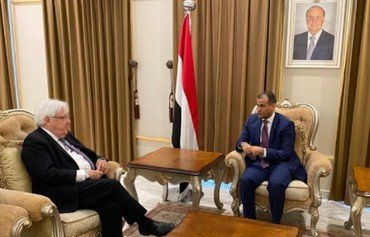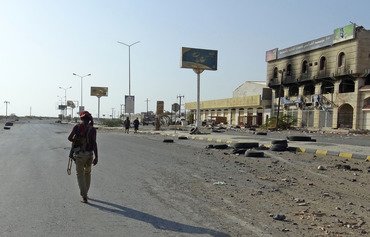Yemen's President Abd Rabbu Mansour Hadi on Monday (October 12th) met in Riyadh with UN special envoy to Yemen Martin Griffiths to discuss a UN-proposed draft for a comprehensive ceasefire in Yemen.
The draft includes the stoppage of war, launch of political negotiations and concurrent economic measures to alleviate the country's economic suffering.
Griffiths arrived in Riyadh on Sunday to meet with Yemeni government officials to convince them to accept the joint draft declaration, after introducing a fourth round of amendments. The government had rejected the earlier versions.
Hadi accused the Iran-backed Houthis (Ansarallah) of "intransigence", and claimed his government has made a host of concessions, but reiterated his "permanent support" for the UN efforts to establish peace in Yemen.
In a separate meeting with Griffiths, Yemeni parliament speaker Soltan al-Borkani claimed the Houthis were disregarding all UN Security Council resolutions and signed agreements.
He accused them of continuing to loot money from the Central Bank branch in al-Hodeidah, and of targeting civilians and economic facilities in that area.
"They also refuse to listen to the world's calls and warnings about the Safer floating storage and offloading (FSO) terminal," he said, and continue to attack Saudi Arabia and threaten regional security and international waterways.
Griffiths confirmed he would proceed with his efforts to "establish the peace which the Yemeni people deserve".
"The military escalation which is taking place now in al-Hodeidah is unacceptable and undermines all chances for peace," he said, voicing concern over the continued fighting in al-Hodeidah and failure to resolve the Safer issue.
Joint declaration, Safer crisis addressed
Griffiths on Friday spoke with the head of the Houthis' Supreme Political Council, Mahdi al-Mashat, to discuss the draft joint declaration and the Safer crisis.
The ceasefire draft includes solutions for resolving the Safer issue, reopening Sanaa Airport and al-Hodeidah seaport, the entry of oil derivatives to Houthi-controlled areas, and payment of salaries to public sector employees.
"The government has accepted a proposal for re-opening Sanaa Airport with the same staff members who were working there before the Houthis took over the city," Deputy Minister of Human Rights Nabil Abdul Hafeez said.
"It also has agreed to re-open al-Hodeidah seaport, provided the Houthis do not control it," he added. "We need to make sure that they do not smuggle in Iranian weapons and military experts."
Reaching an agreement on the ceasefire would pave the way for implementing measures to alleviate the economic suffering in Houthi-held areas, economist Abdul Aziz Thabet told Al-Mashareq.
"The two sides must reach an agreement on the draft to start taking actual steps towards peace and dealing with the urgent economic issues, especially those that have directly affected prices and caused humanitarian suffering," he said.
"The most important item on Griffiths' agenda is to find a solution for the Safer, which is threatening a major environmental and economic disaster to Yemen and regional countries," Thabet said.

![UN special envoy for Yemen Martin Griffiths (R) arrives at Sanaa international airport on July 16th, 2019. [Mohammed Huwais/AFP]](/cnmi_am/images/2020/10/13/26510-UN-special-envoy-600_384.jpg)





